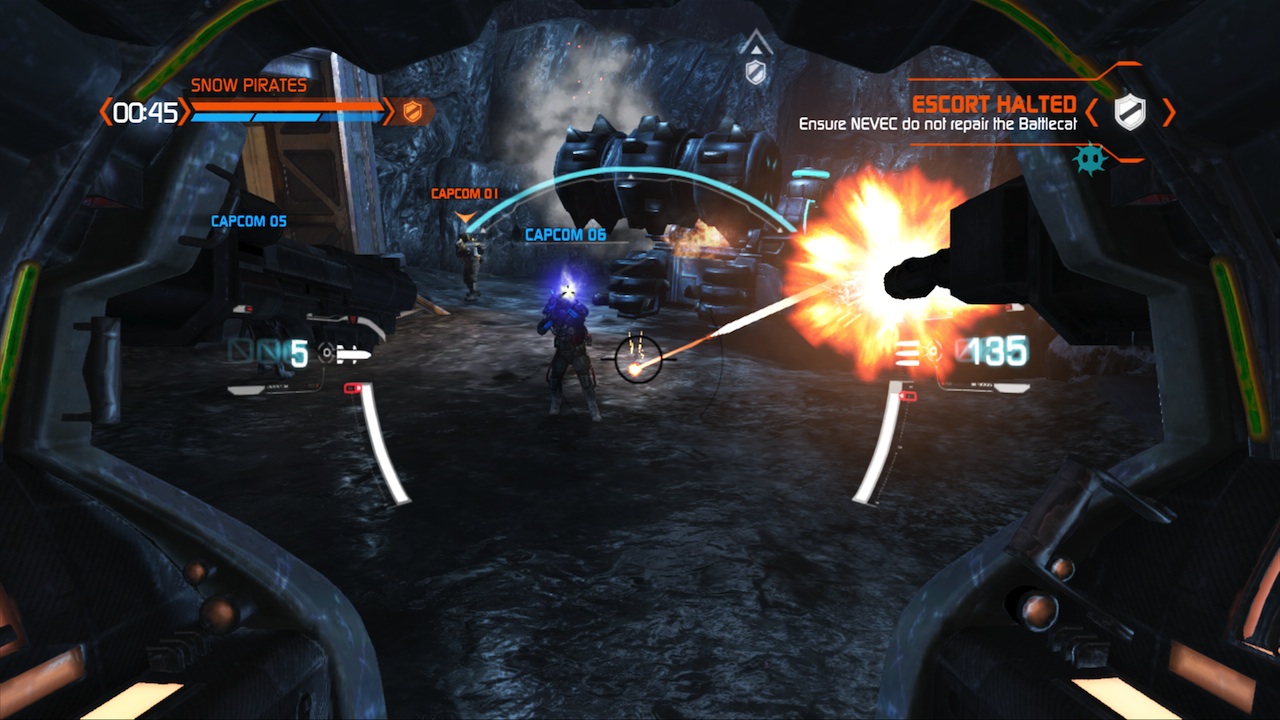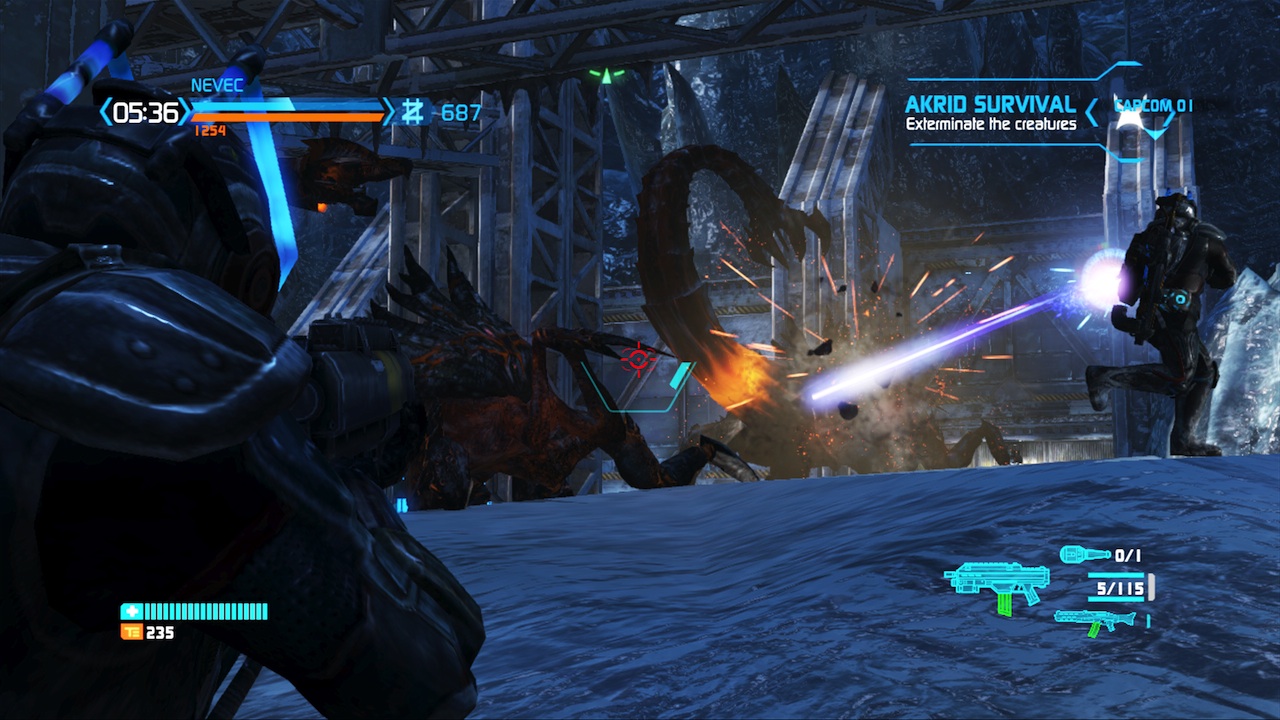Fill 'er up.
Lost Planet 3 returns players to EDN III and the hunt for thermo energy. What'd you think we were searching other planets for, friends? Despite that drive for valuable, ready-to-ship resources back to Earth, players will find that our hero Jim Payton has quite a few new friends to learn and love: scientists studying the planet, roughnecks working the mining operation, or really anyone looking to fight some alien bugs.
There's little between you and those varied objectives too. Players crash-land on the planet, get picked up by two fellow miners, Hutchings and LaRoche, and then waste no time in whipping out a pistol and blasting low-level creepy-crawlies. That valuable thermo-energy you're on the planet to mine also pours out of the alien Akrids too, but none of this is new for longtime fans of Capcom's shooter series. What is new to the series is the massive rig you'll get control over early in the game.
In a hands-off demo of a later sequence, Lost Planet 3 producer Andrew Szymanski showed us how the rig transforms into a massive drilling platform that can unearth huge deposits of thermo-energy. This gameplay loop is introduced in a story objective, but following that, players can spot these reserves on their map and drill as they please.
While the mech sucks that thermo-energy from the soil, you'll have to defend it from attacking monsters. The first waves might hang-out on cliffs and take pot shots at your rig, but the drilling platform carries a weapons stash, so switching your shotgun out for a sniper rifle is easy. The second wave will scare off the first, giving you an opportunity to repair your rig mid-battle. One meter in the bottom left of the screen reads how much thermo-energy is left to mine, while the second displays your rig's health. Players have to monitor these and watch their own backs, evading enemy attacks and clearing the rig of Akrid.
Driving the demo, Szymanski switched to a crossbow with explosive bolts and a scope. When bigger enemies attacked, he switched to a grenade launcher and shotgun. Finally a boss Akrid appeared, and Szymanski carefully dissected it, first focusing fire on the arms and then tossing grenades into the monster's mouth.
In another room at Capcom HQ, our hands-on demo continued and the base players call home opened up to grant access to a weapons dealer, equipment and repair bays, and primary narrative beats. Eagle-eyed players will spot hidden text and audio logs, adding to the game's story as you play, but it doesn't take long for the next mission to come calling.
LaRoche has gone missing on patrol, so Jim Peyton, eager for hazard pay, heads out to rescue him with the rig. With LaRoche found, Akrid predictably descend on our hero. Having not bought a new weapon at Quartermaster Bowers' station, I kited the monsters around the arena and fired my pistol in a panic. Lost Planet 3 quickly pushes players along in these early sequences, forcing Peyton and LaRoche to return to base with a storm on their heels.
On the way back I completed quick-time events to repair structures, open thermal towers, and secure three supports. Quick-time events make these objectives easy and combat-free, but our single-player demo quickly ended and it was time to hop into multiplayer.
Lost Planet hasn't always had competitive modes, but as a shooter with a narrative focus on snow pirates and corporate mining installations, Capcom has the fodder for players eager to fight and die over objectives online. Splitting us into two teams of five, Szymanski detailed the weapons that were unlocked for our demo, including rifles, turrets, and a few more tricks like noxious fumes that you could choke enemies with upon your death.
I was a little too eager and hopped into an Scenario match without changing my load-out. The opposing snow pirates were tasked with stopping our Nevec team from pushing a drill through to the final control point. The pirates could fire directly on the drill or just keep us at distance to halt its progression. This mode felt particularly challenging for the Nevec, but fighting for every inch felt extremely rewarding—the victory even more.

Still, rolling with an assault rifle and a shotgun felt stupidly simple when other players had crossbows and other perks, so I switched things up before the next match. I chose a turret placement and the noxious gas after having my head stomped a few too many times last round, but the other team was too quick in capturing the high ground. This time, the Nevec were supposed to capture and hold points in succession. The first point was housed in a structure with windows and two points of access, making it difficult to spend more than two seconds inside the point safely.
My enemies read my mind, setting up a vicious turret encampment on the roof of the building, making it impossible to climb the icy slope to the point without getting mowed down. That's when I took a zipline to the right and another up the mountain, landing near the enemies spawn. The grappling hook makes upwards mobility as simple as tapping the left bumper.
My avatar of destruction hopped nimbly onto the roof where I found four opposing players camping out with their turrets. Before starting the match I had switched to disc-grenades that exploded on impact, and two of those turned the enemy team to Akrid chow. I enjoyed my vengeance and XP rewards multiplied on my screen, but it wan't long before our screens read defeat anyway.
Scenario mode rotates objectives and this time released one mid-to-boss level Akrid in the arena and forced players to wrestle with prioritizing objectives. Do you attack the Akrid or the enemy team? When the Akrid died, a thermo-canister, which Syzmanski likened to a football, has to be dropped in the enemy team's base, or as it was explained, "their end zone."

In the end, the Akrid made for an amazing distraction, letting players flank, snipe, or set up turrets nearer to the enemy base. Carrying the thermo-canister puts a target on your back, so getting it to the enemy's end zone requires a lot of teamwork and communication. Before jumping into the final mode, I explored the multiplayer progression sphere, a globe of unlockables and skill points that players will gradually fill in as they please. Upgrading your offensive, defensive, or support characteristics just requires a skill point and a decision, but the upper tiers of each skill tree require you to specialize.
As most of the weapons and upgrades were unlocked for us to experiment with, there wasn't much for me to do on the progression sphere. Luckily, the second new game type, Akrid Survival, began soon after, this time pitting us against waves of Akrid before ultimately facing off against our human opponents.
Akrid Survival is points-based, so there's also a layer of competition within your team to get the highest score. As waves of Akrid invade the map, wiping them out will eventually open the gates between you and the enemy team. If you die, you'll respawn with a point penalty, but by the time the third wave comes, you'll be face to face with the other team and Akrid will stop spawning. It feels like a fun warm-up mode, although the experience may change between now and Lost Planet 3's release.
I left Capcom HQ wondering what will happen to Peyton next, how his family might come into play, and whether the snow pirates, Akrid, or frozen terrain would get him first. Even if you haven't played the other games, Lost Planet 3 is shaping up to be a great entry point with a new protagonist and a full multiplayer suite. This summer will get a lot cooler (couldn't avoid it) when Lost Planet 3 arrives on Xbox 360 and PS3 on August 27th.







